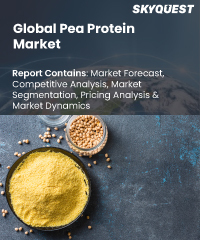
Report ID: SQMIG30I2259

Report ID:
SQMIG30I2259 |
Region:
Global |
Published Date: April, 2024
Pages:
198
|
Tables:
115 |
Figures:
77
Global Pea Protein Market size was valued at USD 1.9 billion in 2022 and is poised to grow from USD 2.13 billion in 2023 to USD 5.27 billion by 2031, growing at a CAGR of 12% during the forecast period (2024-2031).
The demand is expected to increase during the forecast period as a result of growth factors that are increasing interest in plant-based protein, fitness and health trends, and an expanding vegan and vegetarian population. In addition, the market potential for pea protein has increased due to the protein's adaptability and capacity to offer useful qualities including emulsification, texture improvement, and foaming. Additionally, it is anticipated that increased product innovation in terms of manufacturing would result in enormous market potential for products that fulfill certain activities, such as energy balancing, weight loss, muscle restoration, and satiety.
The protein is available in concentrate, textured, & isolate forms and is derived from a variety of pea types, including dry, green, and chickpeas. These goods are perfect for people choosing vegan diets because they are made from plant-based materials. They also have a wide range of applications in beverages, meat alternatives, dietary supplements, & bakery goods and are non-toxic, non-allergic, and easily digestible. The significance of a flexible diet is predicted to continue to expand due to worries about the cardiological effects of red meat consumption. Furthermore, over the course of the forecast years, it is anticipated that growing consumer knowledge of the harmful consequences of foods containing lactose and gluten would play a significant role in boosting product demand.
Lactose-intolerant and health-conscious consumers are significantly increasing in number. These customers seek protein components that are both lactose- and gluten-free. Pea protein meets these criteria, as it is free from gluten and lactose, while also being a high-protein, nutrient-dense food. Consequently, there is a growing demand for vegan protein isolates to fulfill their nutritional needs. This surge in demand for lactose-free and gluten-free products is anticipated to drive the growth of the global pea protein market.
Furthermore, it is anticipated the increased product demand could arise from rising protein-fortified functional food consumption. The launch of new products by food and beverage firms in response to the rising demand for protein supplements in food products is anticipated to positively affect market growth. In order to launch a new range of pea protein beverages on the Belgian market in 2021, Tiptoh, an inventive Belgian start-up, collaborated with Olympia Dairy and SIG. Over the course of the projected period, market expansion is also anticipated to be aided by the rising awareness regarding the intake of protein powder for supporting bone wellness and muscle growth.
The pea protein market's expansion is significantly influenced by the price of pea protein. Cost-effectiveness, pricing that is competitive with animal-based proteins, pricing stability, production efficiency, and customer affordability all play a part in the product's rising market share and appeal. In general, pea protein is less expensive than other sources of protein from plants like soy or almond protein. For food producers wishing to add protein to their goods without considerably raising production costs, its affordability makes it an appealing alternative. Pea protein also has competitive prices as compared with animal-based proteins such whey or casein.
Technological advancements in the pea protein industry, including better extraction and processing techniques, enhanced purification methods, optimization of functional properties, and innovations in product development, are driving its growth. These improvements lead to higher production efficiency, better product quality, a wider range of applications, and address sustainability concerns, thereby increasing the demand for pea protein.
US Pea Protein Market is poised to grow at sustainable CAGR for the next forecast year
Our industry expert will work with you to provide you with customized data in a short amount of time.
REQUEST FREE CUSTOMIZATIONWant to customize this report? This report can be personalized according to your needs. Our analysts and industry experts will work directly with you to understand your requirements and provide you with customized data in a short amount of time. We offer $1000 worth of FREE customization at the time of purchase.

Report ID: SQMIG30I2259